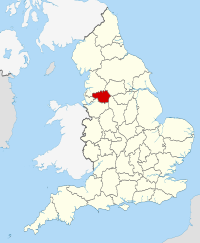
Greater Manchester is a ceremonial county in North West England. It borders Lancashire to the north, Derbyshire and West Yorkshire to the east, Cheshire to the south, and Merseyside to the west. Its largest settlement is the city of Manchester.

Metropolitan counties are a subdivision of England which were originally used for local government. There are six metropolitan counties: Greater Manchester, Merseyside, South Yorkshire, Tyne and Wear, West Midlands and West Yorkshire.

Local government in England broadly consists of three layers: civil parishes, local authorities, and regional authorities. Every part of England is governed by at least one local authority, but parish councils and regional authorities do not exist everywhere. In addition, there are 31 police and crime commissioners, four police, fire and crime commissioners, and ten national park authorities with local government responsibilities. Local government is not standardised across the country, with the last comprehensive reform taking place in 1974.
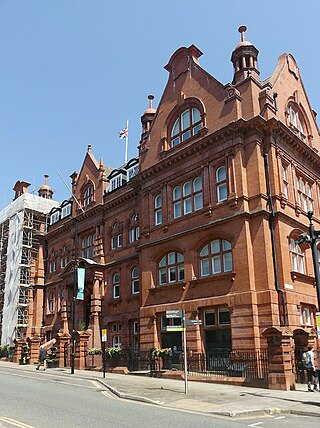
The Metropolitan Borough of Wigan is a metropolitan borough of Greater Manchester, England. It is named after its largest town, Wigan but covers a far larger area which includes the towns of Atherton, Ashton-in-Makerfield, Golborne, Hindley, Ince-in-Makerfield, Leigh and Tyldesley. The borough also covers the villages and suburbs of Abram, Aspull, Astley, Bryn, Hindley Green, Lowton, Mosley Common, Orrell, Pemberton, Shevington, Standish, Winstanley and Worsley Mesnes. The borough is also the second-most populous district in Greater Manchester.

The Metropolitan Borough of Oldham is a metropolitan borough of Greater Manchester in England. It is named after its largest town, Oldham. The borough had a population of 243,912 in 2022, making it the sixth-largest district by population in Greater Manchester. The borough spans 142 square kilometres (55 sq mi).
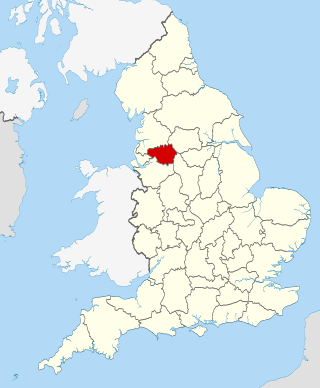
Transport for Greater Manchester (TfGM) is a local government body responsible for co-ordinating transport services throughout Greater Manchester in North West England. It is an executive arm of the Greater Manchester Combined Authority (GMCA), the city region's administrative authority. The strategies and policies of Transport for Greater Manchester are set by the GMCA and its Greater Manchester Transport Committee (GMTC). The committee is made up of 33 councillors appointed from the ten Greater Manchester boroughs, as well as the Mayor of Greater Manchester.
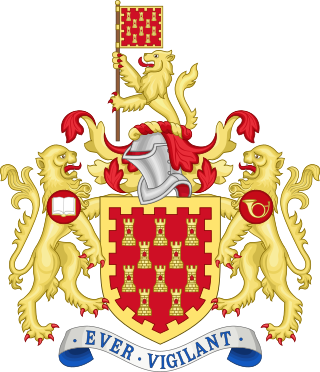
The Greater Manchester County Council (GMCC) was the top-tier local government administrative body for Greater Manchester from 1974 to 1986. A strategic authority, with responsibilities for roads, public transport, planning, emergency services and waste disposal, it was composed of 106 directly elected members drawn from the ten metropolitan boroughs of Greater Manchester. The Greater Manchester County Council shared power with ten lower-tier district councils, each of which directed local matters. It was also known as the Greater Manchester Council (GMC) and the Greater Manchester Metropolitan County Council (GMMCC).

Leeds City Council is the local authority of the City of Leeds in West Yorkshire, England. It is a metropolitan district council, one of five in West Yorkshire and one of 36 in the metropolitan counties of England, and provides the majority of local government services in Leeds. It has the second-largest population of any council in the United Kingdom with approximately 800,000 inhabitants living within its area; only Birmingham City Council has more. Since 1 April 2014, it has been a constituent council of the West Yorkshire Combined Authority.

Local authority areas in England typically have an executive leader and a cabinet selected from the local council, similar to how the national prime minister and cabinet are selected from Parliament. In contrast, residents of some areas, or groups of areas known as combined authorities or combined county authorities, directly elect the executive mayors of their local government.

The Association of Greater Manchester Authorities (AGMA) is the local government association for Greater Manchester, a metropolitan county in North West England. It was established in 1986 as a voluntary organisation to represent the ten district councils of Greater Manchester after the Greater Manchester County Council was abolished. AGMA develops policy, lobbies government and others, and runs a range of services designed to make strategic and tangible advances in the standard of living across Greater Manchester. Its Policy and Research Unit is based in Wigan,

A combined authority (CA) is a type of local government institution introduced in England outside Greater London by the Local Democracy, Economic Development and Construction Act 2009. CAs are created voluntarily and allow a group of local authorities to pool appropriate responsibility and receive certain devolved functions from central government in order to deliver transport and economic policy more effectively over a wider area. In areas where local government is two-tier, both must participate in the combined authority.

The Mayor of Salford is a directly elected politician responsible for the executive functions of Salford City Council, created in 2012 for the City of Salford in Greater Manchester. The position is different from the long-existing and largely ceremonial, annually appointed ceremonial mayor of Salford.

Wakefield Council, formally the City of Wakefield Metropolitan District Council, is the local authority of the City of Wakefield in West Yorkshire, England. Wakefield is a metropolitan borough with city status. The council and provides a full range of local government services including Council Tax billing, libraries, social services, town planning, waste collection and disposal, and it is a local education authority. Wakefield is divided into 21 wards, electing 63 councillors. A third of the council is elected for three of every four years.

Oldham Metropolitan Borough Council, branded and commonly referred to as Oldham Council, is the local authority of the Metropolitan Borough of Oldham in Greater Manchester, England. It is a metropolitan district council, one of ten in Greater Manchester and one of 36 in the metropolitan counties of England, and provides the majority of local government services in Oldham. It is composed of 60 councillors, three for each of the 20 electoral wards of the borough.

The Liverpool City Region Combined Authority (LCRCA), officially the Halton, Knowsley, Liverpool, St Helens, Sefton and Wirral Combined Authority, is the combined authority of the Liverpool City Region in England. Its area includes the City of Liverpool local authority area, the Metropolitan Boroughs of Knowsley, St Helens, Sefton, and Wirral, and the Borough of Halton. It was established on 1 April 2014 by statutory instrument under the provisions of the Local Democracy, Economic Development and Construction Act 2009. Composition of the combined authority is made up of the leaders of the six principal membership authorities, plus several non-voting members with various vested interests in the activities of the combined authority.

The Mayor of Greater Manchester is the directly elected mayor of Greater Manchester, responsible for strategic governance in the region that includes health, transport, housing, strategic planning, waste management, policing, the Greater Manchester Fire and Rescue Service and skills. The creation of the Mayor of Greater Manchester was agreed between the then Chancellor of the Exchequer, George Osborne, and Greater Manchester's 10 district council leaders. As well as having specific powers, the mayor chairs the Greater Manchester Combined Authority, also assuming the powers of the Greater Manchester Police and Crime Commissioner.

The Cities and Local Government Devolution Act 2016 is an Act of the Parliament of the United Kingdom that allows for the introduction of directly elected mayors to combined authorities in England and Wales and the devolution of housing, transport, planning and policing powers to them. The bill was introduced to the House of Lords by Baroness Williams of Trafford, the Parliamentary Under Secretary of State for Communities and Local Government, on 28 May 2015.
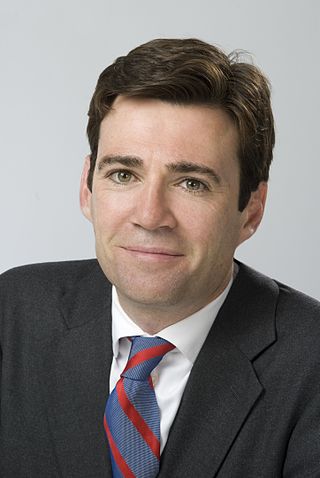
The 2021 Greater Manchester mayoral election was held on 6 May 2021 to elect the mayor of Greater Manchester. This election, alongside other local and mayoral elections across England and Wales, was originally scheduled to take place on 7 May 2020, but was delayed by the UK Government on 13 March 2020, due to the unfolding COVID-19 pandemic. The election took place on the same day as council elections within the city-region, including the election for the mayor of Salford, as well as elections across England and Wales. It was the second election to the position of mayor. It used the supplementary vote as its electoral system.

The Mayor of West Yorkshire is a directly elected mayor responsible for the metropolitan county of West Yorkshire in England. The Mayor chairs and leads the West Yorkshire Combined Authority, and assumes the office and powers of the West Yorkshire Police and Crime Commissioner.
The 2022 Oldham Metropolitan Borough Council election took place on 5 May 2022. One third—20 out of 60—of councillors on Oldham Council was elected. The election took place alongside other local elections across the United Kingdom.

